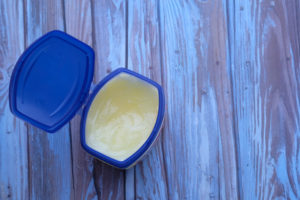
Eczema is one of the leading skin ailments in the US. That’s evident by the $3.8 billion per year that’s spent on treatments and medications.
A large percentage of infants develop atopic dermatitis, the most common form of eczema. It can be either lifelong and chronic or heal on its own over time and is linked to many other ailments that include hay fever, asthma, allergies, insomnia, sleep apnea, and weight gain.
Researchers have found that Americans spend as much as 35 percent of their discretionary income on care for this type of eczema monthly. Estimates put the total cost of eczema care in the U.S. at up to $3.8 billion per year.
Now, new studies are saying that a solution might be found at your local drugstore for under $7. Researchers suggest that moisturizing newborns with petroleum jelly until they are six months old can help cure and possibly prevent the skin disorder.
“We could really save a lot of newborns ― and save families ― a lot of suffering,” researcher Dr. Steve Xu, a resident physician in the department of dermatology at Northwestern Feinberg School of Medicine, told The Huffington Post in an article earlier this year.
Dr. Xu led a 2014 study of 124 babies, in which researchers from Oregon Health & Science University found that parents cut their newborns’ risk of atopic dermatitis in half when they layered petroleum jelly on their skin along with any other regular moisturizers daily (or at least 5 times a week, everywhere but the scalp) up to their sixth month of life.
The study participants used either an over-the-counter drugstore ointment, moisturizing cream or sunflower seed oil, all of which provided a similar benefit in terms of preventing eczema.
What We Still Don’t Know About the Petroleum Jelly Cure
Moisturizers are a big part of the way eczema is treated, but until now they haven’t necessarily been used as a cure. The evidence is still unclear as to how they actually help get rid of the condition, partly because we still don’t know what causes it in the first place, and why individuals who have it are so likely to go on to develop allergies, hay fever, and asthma.
The researchers suspect using moisturizers during infancy helps correct outer-layer skin defects in babies who will go on to develop eczema. Those defects are thought to play a role in how the condition actually develops, along with hereditary and environmental factors.
Whether or not preventing eczema would also prevent the allergies, hay fever, and asthma that come along with it is yet another unsolved question. But there’s a growing body of data that suggests that atopic dermatitis does in fact make individuals more susceptible to these comorbidities, which some doctors refer to as the “atopic march.”
Vaseline petroleum jelly is one of the moisturizers recommended for the treatment of eczema by the National Eczema Association, though not as a prophylactic treatment. The American Academy of Pediatrics recommends petroleum jelly as one of the top choice moisturizers for treating (not necessarily preventing) eczema, including atopic dermatitis, because it’s among the most moisturizing.
Plus, it’s safe, Xu said. Petroleum jelly is fragrance-free and doesn’t have preservatives or additives that could potentially cause irritation or other allergies, he added. That said, some people may still avoid it for political or environmental reasons: Petroleum jelly is actually a byproduct of the oil refining process.
Sunflower seed oil was the second cheapest moisturizer in the study, costing about $20 for six months of using it daily on a newborn, and may be a solid choice for those who want to avoid petroleum jelly.
But, before you slather your baby with Vaseline, talk to your doctor first. Pediatricians agree that not all infants need to be protected by the thick moisturizer in order to avoid the skin condition.
It’s important to note that the initial study only included babies who were already considered high-risk of developing atopic dermatitis: They each had a parent or sibling who had at some point been diagnosed with eczema, asthma or hay fever.
Researchers are still conducting longer and larger studies to confirm that the method continues to prevent atopic dermatitis in babies who were moisturized beyond the first six months of their lives. But the findings from this latest study are encouraging.

Jasmine Browley holds an MA in journalism from Columbia College Chicago, and has contributed to Ebony, Jet and MADE Magazine among others. So, clearly, she knows some stuff. Follow her digital journey @JasmineBrowley.









